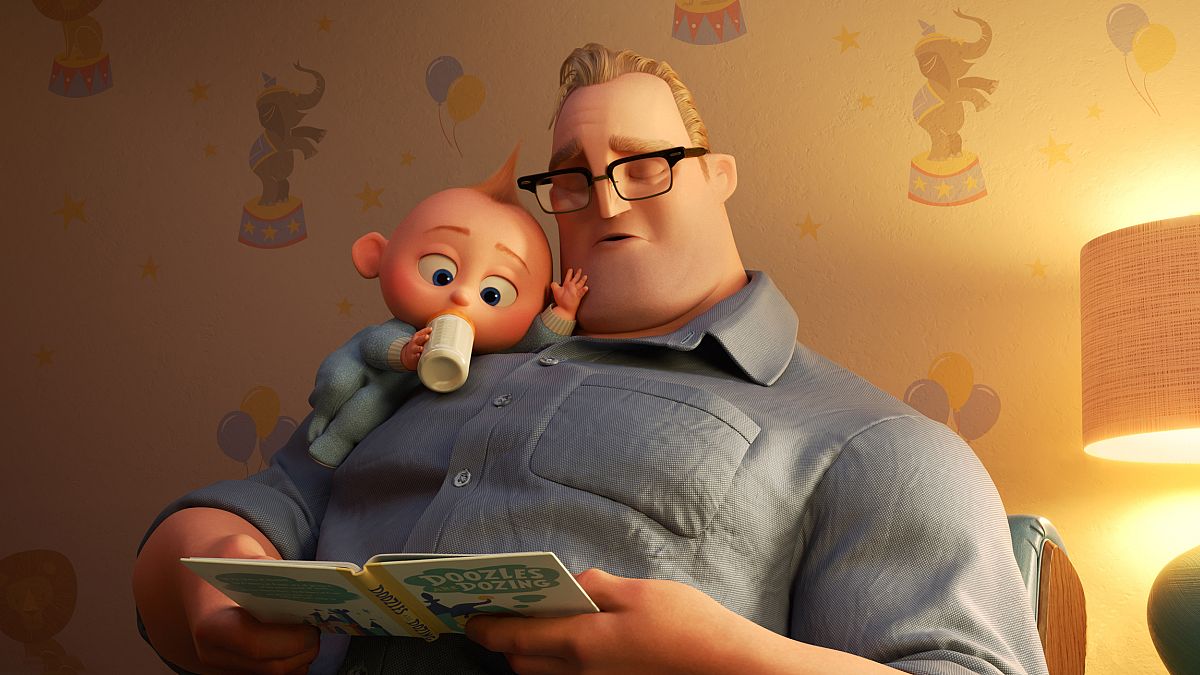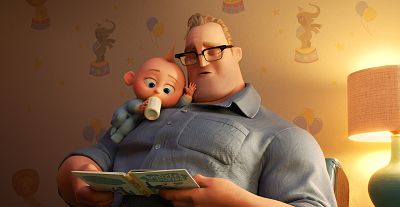Pixar's new animated sequel explores the idea that growing up doesn't mean you have to stop doing what you love.
It's been 14 years since the original "The Incredibles" arrived back in 2004. Pixar is known for long stretches between their sequels, but this is the longest they've ever waited. (The second longest was between "Finding Nemo" in 2003 and "Finding Dory," which arrived in 2016.) The demand seems to have worked in their favor. Over the holiday weekend, the series smashed the box office record for largest opening ever for an animated film with $180 million in sales. (Ironically, the record it beat was held by "Finding Dory," which was released during this exact same Father's Day period to the tune of $135 million.)
The original film was ahead of its time, debuting a good four years before superhero movies really took off (and then took over). In the ensuing decade, the saga of the talented Parr family has managed to hold up quite well as both an homage to and a parody of a now ubiquitous genre. Indeed, despite the proliferation of superheroes from across the Marvel and DC universes, there remains something somewhat unique about how the "Incredibles" tells its story. This is a world that explores what happens when the heroes have to start doing all those annoying adult chores — while still maintaining their professions.
Despite the proliferation of superheroes from across the Marvel and DC universes, there remains something somewhat unique about how “The Incredibles” tells its story.
The superhero genre generally de-emphasizes traditional family units. Batman and Superman are both orphans; the former is raised by the family butler, the latter by a nice adopted people who fade into the background. Many origin stories revolve around parents or parent figures dying while characters are young. In the case of the "X-Men" franchise, parental rejection of mutant children is a plot motivator.
Moreover, it's a rare thing for superheroes to be in successful long-term relationships. Captain America leaves Peggy Carter behind when he travels through time. Love interests like Dr. Strange's might as well not have existed. Thor hasn't seen Jane since Natalie Portman decided she was done making these sorts of films. Those who do have relationships see them falter when they choose to go out on adventures, like the forever failing-to-get-married Iron Man and Pepper Potts. Marriage and children represent a "growing up" of sorts, where risk-taking and saving the world must be put aside for more adult concerns.
That's not how any of this works in real life. People land careers, meet others in their field, fall in love, often get married and often have kids. Sometimes falling in love means giving up your job (especially if you're a woman) but for many people there are ways to do both, in some form or another. The moral of the original "The Incredibles," however, was that growing up doesn't mean you have to stop doing what you love.
"Incredibles 2" picks up directly after the events of the first film (because as a cartoon no one ever ages unless the illustrator decides they will.) Our family has learned its lesson: Superhero work is in their blood, and it's what they want to do for a living. But what does that look like for a family of five?Do the kids have to wait until they turn 18 to join in on the fun? Does dad do most of the saving while mom makes dinner? This patriarchal option would make sense for the 1960s, when the film technically takes place. But thankfully the movie flips the scripts and sends mother Helen (aka Elastigirl) out to do the saving while Mr. Incredible gets to do the bumbling stay-at-home dad routine.
While nods are made towards the 1960s in style and background, the film's themes are decidedly modern. Much like what happens in the Marvel Cinematic Universe, the antics of superheroes have made them unpopular with politicians who want them to hide their special abilities. Helen's opportunity to shine is both an issue of funding and PR — she secures the backing of a benevolent albeit not-altogether-sane billionaire who wants to change the perception of superheroes. Helen's ability to save people without collateral damage makes her appealing to this effort, but so does her implicit sex appeal. So while this may seem like a feminist choice, Helen's selection as the poster child of superheroes is actually more complicated.
In between, the film explores the challenges of raising kids with superpowers. Teenage breakups never looked as realistic as when daughter Violet (whose powers including invisibility) slips into the kitchen — and a tub of ice cream floats through the air, seemingly unnacompanied, back to her room. Son Dash may be able to run circles around everyone else, but math causes him to crash into a brick wall of befuddlement. But the highlight is baby Jack-Jack, who is still at the point in his superhero development where his powers are malleable, giving the film license to have him try on a new power every five minutes. Babysitters should charge extra.
Live-action superhero films cut themselves off from these sorts of delights when they reject the notion of superheroes and traditional families.
Live-action superhero films cut themselves off from these sorts of delights when they reject the notion of superheroes and traditional families. It can also make films feel less relatable to audiences. On the other hand, the father watching next to me laughed with the enthusiasm of a man who knows exactly how a deeply sleep-deprived Mr. Incredible felt while attempting to convince his wife that everything at home was fine, and of course she didn't need to cut her business trop short and come home! (Whether or not his baby has ever gotten into a fight with a raccoon is another matter.)
Marvel will begin to explore the idea of superheroes in traditional relationships later this summer, when "Ant-Man & the Wasp" arrives in theaters as part of their expansion of the genre. The smart move would be to take some lessons from Pixar. The studio's movies may be for children, but their wisdom is ageless.
Ani Bundel has been blogging professionally since 2010. Regular bylines can be found at Elite Daily, WETA's TellyVisions, and Ani-Izzy.com.

